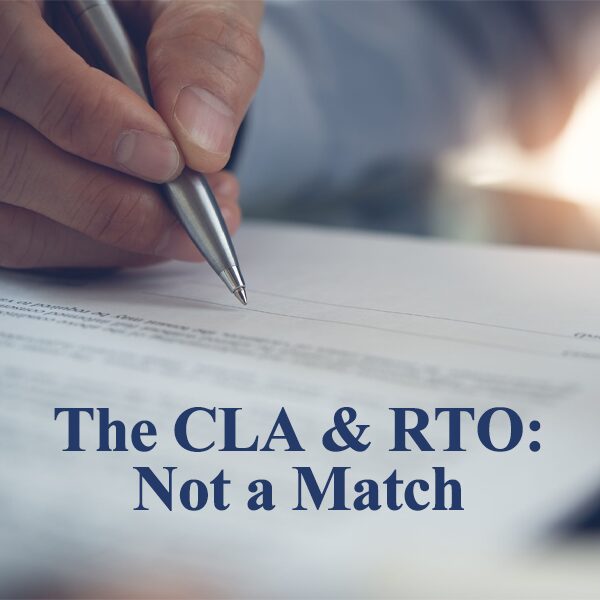The federal Consumer Leasing Act has never suited the rent-to-own transaction – here’s why state statutes are a better bet to protect our industry & consumers alike
CLA leases are simply not RTO transactions; they have a longer term, less flexibility, and different expectations concerning cancellation and ownership options than RTO consumers want.
In September, the Consumer Financial Protection Bureau (CFPB) along with 41 state attorneys general concluded their dual investigations of a company that had been doing business with customers via federal consumer leases – rather than state-regulated rent-to-own leases – for an assortment of products, including TVs, appliances, and furniture. The end result of these investigations was the company’s Assurance of Voluntary Compliance/Discontinuance with the CFPB and a Negotiated Consent Order with the 41 states. The company agreed to pay a fine, cancel all existing leases, give the leased property to customers with no further payments due, and quit offering consumer leases altogether. The company also agreed not to send any negative reports to any consumer reporting agencies.
The severity of these federal and state actions against this company makes it worthwhile to review the important differences between transactions under the federal Consumer Leasing Act (CLA) and those under various state RTO statutes.
When APRO was created in 1980, there were no rent-to-own laws anywhere covering traditional week-toweek or month-to-month rental agreements with purchase options and the right to terminate anytime without penalty. There was the CLA, enacted in 1976, but rental dealers were leery of doing business using federal consumer leases, as the federal law did not fit the rent-toown business model. The CLA didn’t fit RTO then, and it doesn’t fit RTO now.
Use of federal consumer leases has never been widespread in the TV, appliance, and furniture world; their use has occurred from time to time because federal consumer leases offer multistate dealers the virtue and ease of “one size fits all.” Additionally, the CLA is a pure disclosure statute – there are, for example, no price controls within the statute. Since it is a federal law, the CLA applies to the types of leases it covers everywhere, whereas state rent-to-own statutes typically apply only to RTO within any given state’s borders. Despite the simplicity and uniformity of having a single CLA-governed lease transaction, rather than the state-by-state rent-toown approach, these latest pronouncements from the CFPB and the 41 state attorneys general might mean termination of the use of CLA leases across the board for items like TVs, appliances, and furniture.
The main obstacle to doing business under the CLA is that those leases are simply not RTO transactions. CLA leases have a much longer term, less flexibility for the consumer, and different expectations with respect to cancellation and ownership options than rent-to-own consumers want. Additionally, the CLA and Regulation M – the interpretive regulation for the CLA – offer limited clarity about whether such leases are actually credit sales. Regulation M explains that if a transaction meets the definition of a “credit sale” under the Federal Truth in Lending Act (TILA), then it can’t be a consumer lease. By contrast, the state rent-to-own statutes all provide exactly the kind of clarity necessary, by appropriately recognizing RTO transactions as separate and distinct from credit transactions There are two key reasons the federal CLA isn’t a good fit for rent-to-own:
1.The Four Month Rule: To qualify as a consumer lease under the CLA, the initial term of the transaction must be for a term longer than four months, which means the consumer must be contractually obligated to make payments for at least that period of time. The recent government action reviewed transactions with an initial term of five months; the five-month contractual obligation must be a “real” obligation, not a “pretend” one, which means if the customer stopped paying after, say, two months, the lessor would need to collect the additional three months’ payments remaining on the obligation to qualify as a CLA lease. Which might not mean suing every customer who defaults on the fivemonth obligation, but would mean making a demand for the payment due because of the breach of contract. If the CLA lessor routinely did nothing about the unpaid amount, then the contractual obligation could be attacked as not being a CLA lease transaction.
Under TILA, which was first enacted in 1976, and some state consumer credit laws, some non-RTO leases are considered credit sales. Under TILA, if 1) the consumer is contractually obligated to pay an amount “substantially equivalent” to the value of the property and services covered by the transaction, and 2) the consumer can obtain ownership by payment of a “nominal consideration” at the end, then the purported CLA lease may be a credit sale and not a lease at all.
There is no clear definition of “substantially equivalent” under TILA, but the CFPB claims that in many of the transactions it reviewed, the required five-month obligation to make lease payments equaled 90% of the cash price of the property, with ownership not transferring for up to three more years. Definitions of “substantially equivalent” in the law vary, but 90% can be argued to be close to the line. Of course, in rent-to-own, there is no contractual obligation beyond the initial short term (usually one week to one month at the longest), and rent-to-own customers can terminate the lease anytime without penalty if it no longer meets their needs. Therefore, an RTO transaction is very different from a “credit sale.”
2.Nominal Consideration: At the back end of the CLA lease transaction is the issue of how to define “nominal consideration,” the second way of determining whether a CLA lease may actually be a credit sale. For a long time, the concept of nominal consideration was a confused legal doctrine at best. In some cases, it might be a mustard seed, while in others, it might be $1 or $10. The issue was finally resolved in the early 1990s when the Uniform Commercial Code (UCC) was amended by adding Article 2A – the Uniform Personal Property Leasing Act – with accompanying amendments to some definitions in Article 1.
The new Article 2A definition attempts to resolve the issue of how much is “nominal” by saying the consideration is not nominal if, “when the option to become the owner of the goods is granted to the lessee, the price is stated to be the fair-market value of the goods determined at the time the option is to be performed.” [UCC 1-207(37) (d)(1)]
So, if the CLA lessee either has no option to purchase or must pay the fair market value for the merchandise to acquire ownership, then the CLA transaction should not be deemed a credit sale, because the price paid for the purchase equals the value of the merchandise, i.e. what the property is worth at the time. Therefore, it’s not “nominal.” Of course, a lower price may also be considered “not nominal,” depending upon the transaction circumstances.
Consumer leases under the CLA might not work in the TV, appliance, and furniture worlds, but they have become popular and are widely used in the motor-vehicle industry. The common wisdom for vehicle leases is that if they lease, consumers get to drive nicer, more expensive vehicles than if they purchase it, because at the end of the lease term, the consumer will still have to buy the vehicle for its then-esti mated market value to own it.
In the automotive arena, sources for determining the value of used vehicles are readily available – there are several different “blue books” that list trade-in values, as well as values for sales at car dealerships and sales by private parties, for all makes and models going back decades.
No such blue books exist for used TVs, appliances, and furniture. Rental dealers would have to peruse Amazon Marketplace, Craig’s List, or Facebook Marketplace, or scour local garage sales, to get an idea of the accurate pricing of used product. Coming up with a fair-market value for a used TV, for instance, would be hit or miss at best, and a miss could be very expensive.
This marketplace reality means dealers wanting to use a federal consumer lease would need to have a final fair-market value balloon – which might be difficult to estimate in advance – at the end of the transaction. The CLA lessor could provide in the agreement that ownership will transfer once the customer makes a final fair-market balloon payment, but the lease must disclose the purchase price at the end of the lease term, as well as the purchase price or method for determining it if the option is exercised during the lease. So a prediction about that price and a method for determining it must be disclosed at the front end.
In comparison, state rent-to-own transactions are much more straightforward, easier to explain, and for the customer to understand: “Here is the cash price if you choose to buy the item today. Here is what it costs each week or month to rent if you choose to keep renewing your lease. If you decide to use and possess the product by renting it for this many weeks or months, then you will own it and owe nothing else, and here is how much you will have paid in total for your lease and ownership. You can also purchase the property at any time during the rental period for a disclosed price and save money, or you can return the item anytime you like.”
Beyond the clear mismatch between the CLA and the RTO business model, there are other issues to consider when using a federal consumer lease for TVs, appliances, and furniture. Twenty-one states have enacted their own versions of the CLA, with the four-month initial term requirement to distinguish those transactions from rent-to-own transactions, defined everywhere as having an initial term of less than four months. These state mini-CLA statutes follow the federal law fairly closely, but they do differ from the federal law and from each other in some details. Any rental dealers using a federal lease might have to have an addendum with the state variations, like you might see in some insurance policies.
Additionally, several states have extremely broad definitions of “credit sale” in their retail installment sales laws – and a CLA lease might satisfy some of these definitions. For example, the Pennsylvania Goods and Services Installment Act says that the term “credit sale” includes leases with an option to make the payments and obtain ownership. But the safe-harbor language in the Pennsylvania RTO statute makes it clear that rent-to-own is a distinct transaction, and is not considered credit in the Keystone State.
But if it weren’t for the safe-harbor language used in the Pennsylvania RTO statute – declaring that rent-to-own transactions, as defined, are not and cannot be construed to be credit sales – RTO would be considered a credit in Pennsylvania. In West Virginia, there is an Attorney General Rule that says every consumer transaction that can result in the consumer’s ownership of the property is either a rent-to-own transaction under the state RTO statute or a credit sale under the state RISA (Sec. 142-22- 1(1994)). Similar issues involving broad definitions of credit also exist in California, Indiana, New Jersey, and Wisconsin.
The bottom line is, rent-to-own customers like the flexibility and options they get with RTO. There is little to be gained by offering federal consumer leases for TVs, appliances, and furniture, and much has been lost by doing business that way. State rent-to-own statutes have stood the test of time; the first ones were enacted in the early 1980s, and consumers have come to understand how RTO works, and depend upon and appreciate its significant flexibility and options, which make rent-to-own among the most flexible alternatives available. Consumers are being both well-served by the RTO industry and well-protected by their state rent-to-own statutes.
Ed Winn III serves as APRO General Counsel. For legal advice, members in good standing can email legal@rtohq.org.










